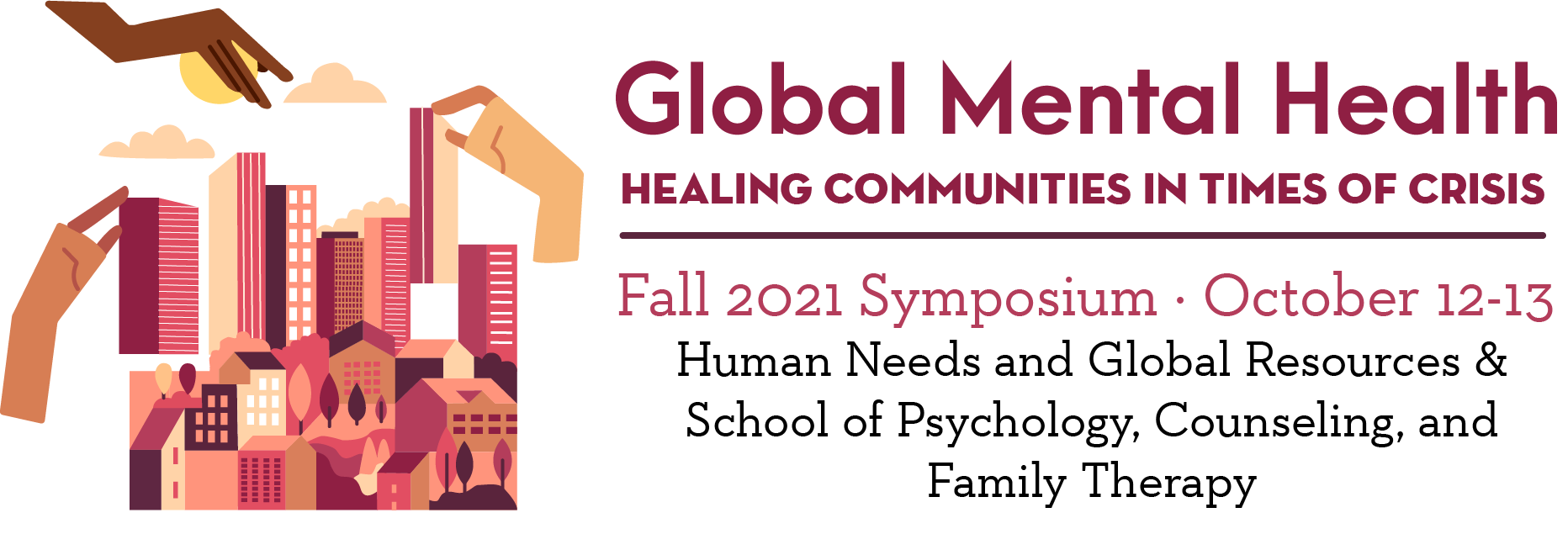2021 HNGR Symposium
Global Mental Health: Healing Communities in Times of Crisis

2021 Symposium Theme and Content
The 2021 Wheaton College Symposium in Human Needs and Global Resources will convene leading mental health researchers and practitioners to consider the diverse and significant impacts of COVID-19 on mental health, on mental health services, and on frontline workers, and specifically church leaders and community health workers, who provide care and services to vulnerable populations. The annual Symposium, which is generously sponsored by the John Deere Foundation, will be a collaborative event organized by the Human Needs and Global Resources Program and the School of Psychology, Counseling, and Family Therapy. This joint Symposium will feature medical doctors, psychiatrists, counselors, and church leaders whose work and ministry aims to understand the factors that strengthen human mental health, community well-being, and community health infrastructure, and especially within and among vulnerable populations.
The presentations and workshops planned for the Symposium will explore several timely questions related to global mental health. One important set of questions concerns the impact of COVID-19 pandemic on the mental health of vulnerable groups and communities. Symposium presenters will draw on their work and research with diverse communities in Asia and North America to describe how the pandemic has affected people with existing mental health illnesses. Other questions that presenters will explore include: What new patterns of mental ill health and vulnerabilities have been generated by the pandemic? What have been the impacts of the pandemic upon mental health services, and especially upon community-based psychosocial support activities? How have frontline workers, including health care workers and faith-based caregivers, been impacted by COVID-19? How have local organizations and agencies that provide mental health care services and psychosocial support adapted their service strategies and practices?
Another thematic focus of the Symposium will be on mental health initiatives that seek to build the capacities of specialists and non-specialists alike to provide psychological services to vulnerable populations. Several Symposium presenters will detail their work with faith-based organizations, including local churches, church denominational networks, and faith-based development and health care organizations, in order to develop novel approaches to mental health care in contexts where health care systems are limited or non-existent.
Plenary lecture (Tuesday, October 12, 6:30-8:00pm, Barrows Auditorium)
Need and Calling: A Story of a Mental Health Movement in India
Dr. Raja Paulraj
Plenary panel (Wednesday, October 13, 4:30-6:00 pm, Barrows Auditorium)
Mental Health in Global Perspective: Research and practice in Hungary, India, and the United States
Panel participants: Drs. Sally Canning, Chuck Liu, Raja Paulraj, and Szabi Török
Moderated by Dr. Mandy Kellums Baraka
About the Speakers
Dr. Raja Paulraj

Dr. Paulraj is a medical doctor, psychiatrist, and counselor based in Landour, Mussoorie, India, where he currently serves as a consultant psychiatrist and counselor with Emmanuel Hospital Association (EHA). Before joining EHA, Dr. Paulraj worked as a psychiatrist in various hospitals across India. He is passionate about equipping the faith-based organizations to develop their capacity to work as healing communities by providing counseling and care to those who are suffering and especially to people with mental illness. Other areas of work for him include being a staff care consultant with the global team of International Justice Mission (IJM). He serves as a non-resident scholar at the Center for Spirituality, Theology, and Health at Duke University School of Medicine, which promotes research in the area of spirituality and health. Dr. Paulraj also worked as a counselor for the Christian Counseling and Educational Foundation (CCEF) for three years. He is married to Jess and they have five children and they love exploring mountains, drinking chai, and meeting new people.
Dr. Szabi Török
 Szabi is a medical doctor, marriage and family therapist, and associate professor at the Institute of Mental Health, Semmelweis University, Budapest, Hungary. He is currently a Fulbright Research Scholar and a guest faculty member in the Marriage and Family Therapy (MFT) program at Wheaton College. His most recent research focuses on identifying effective training systems and teaching methods in the field of MFT. Together with Dr. David Van Dyke (director of MFT program at Wheaton College), Szabi is aiming to provide MFT training opportunities for professionals in the Central and Eastern European region where mental health needs have been exacerbated by the recent pandemic. For the academic year 2021/22 Dr. Török lives in Wheaton with his wife and their four children.
Szabi is a medical doctor, marriage and family therapist, and associate professor at the Institute of Mental Health, Semmelweis University, Budapest, Hungary. He is currently a Fulbright Research Scholar and a guest faculty member in the Marriage and Family Therapy (MFT) program at Wheaton College. His most recent research focuses on identifying effective training systems and teaching methods in the field of MFT. Together with Dr. David Van Dyke (director of MFT program at Wheaton College), Szabi is aiming to provide MFT training opportunities for professionals in the Central and Eastern European region where mental health needs have been exacerbated by the recent pandemic. For the academic year 2021/22 Dr. Török lives in Wheaton with his wife and their four children.
Dr. Chuck Liu
 Dr. Chuck Liu is a clinical psychologist and a HNGR alumnus currently teaching in the School of Psychology, Counseling, and Family Therapy at Wheaton College. He received his clinical training at a rural integrated primary care clinic in Hawai'i working with providers to holistically serve the Native Hawai'ian and local community. His research areas are in intersections of culture and Asian American mental health. Along with his colleague Dr. Tao Liu, he is currently researching the mental health impacts of COVID-19 racism in the Asian American community.
Dr. Chuck Liu is a clinical psychologist and a HNGR alumnus currently teaching in the School of Psychology, Counseling, and Family Therapy at Wheaton College. He received his clinical training at a rural integrated primary care clinic in Hawai'i working with providers to holistically serve the Native Hawai'ian and local community. His research areas are in intersections of culture and Asian American mental health. Along with his colleague Dr. Tao Liu, he is currently researching the mental health impacts of COVID-19 racism in the Asian American community.
Dr. Sally Schwer Canning
 A community and licensed clinical psychologist, Dr. Canning is Professor of Psychology in the doctoral program at Wheaton College. She was named the 2017 Distinguished Leader for Women in Psychology by The Committee on Women in Psychology of the American Psychological Association. Her calling is to support the well-being of children and families in poor urban communities, and to join with caregivers, community members and professionals in other disciplines to disrupt the status quo of poverty and other forms of injustice. Current research projects focus on the life narratives of individuals exiting the sale of sex, the effectiveness of a brief intervention for internalizing/externalizing problems of pediatric patients in primary care, and the well-being of advanced practice professionals serving in medically underserved primary care contexts. Dr. Canning practiced as a Behavioral Health Provider and supervisor at the Lawndale Christian Health Center, a primary care clinic serving patients in poor, medically underserved neighborhoods in Chicago.
A community and licensed clinical psychologist, Dr. Canning is Professor of Psychology in the doctoral program at Wheaton College. She was named the 2017 Distinguished Leader for Women in Psychology by The Committee on Women in Psychology of the American Psychological Association. Her calling is to support the well-being of children and families in poor urban communities, and to join with caregivers, community members and professionals in other disciplines to disrupt the status quo of poverty and other forms of injustice. Current research projects focus on the life narratives of individuals exiting the sale of sex, the effectiveness of a brief intervention for internalizing/externalizing problems of pediatric patients in primary care, and the well-being of advanced practice professionals serving in medically underserved primary care contexts. Dr. Canning practiced as a Behavioral Health Provider and supervisor at the Lawndale Christian Health Center, a primary care clinic serving patients in poor, medically underserved neighborhoods in Chicago.
